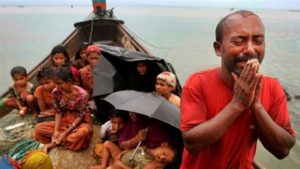Rohingya refugee crisis growing
A massive influx of Rohingya refugees fleeing recent violence in Myanmar has pushed aid services in Bangladesh to the brink, with established camps already beyond capacity, aid agencies say.
The UNHCR, the UN’s refugee agency, says around 130,000 refugees have fled western Myanmar since the end of August.
Both Myanmar’s security officials and insurgents from the Rohingya ethnic minority are accusing each other of burning down villages and committing atrocities in Myanmar’s Rakhine state.
 The military has said nearly 400 people, most of them insurgents, have died in armed clashes.
The military has said nearly 400 people, most of them insurgents, have died in armed clashes.
The violence has triggered a flood of refugees crossing mostly on foot into Bangladesh, though some were fleeing in wooden boats.
Satellite images analysed by the NGO Human Rights Watch shows hundreds of buildings had been destroyed in at least 17 sites across Rakhine state in recent weeks.
There are around 700 structures that appeared to have been burned down in just the village of Chein Khar Li, the international rights watchdog said in a statement.
Reporters and news crews have been prevented from entering Rakhine state by Myanmar’s military since the start of the conflict.
Advocates for the Rohingya, an oppressed Muslim minority in overwhelmingly Buddhist Myanmar, say security forces and vigilantes both have attacked and burned villages, shooting civilians and causing others to flee.
The government blames the insurgents for burning their own homes and killing Buddhists in Rakhine. Longstanding tension between the Rohingya Muslims and Buddhists erupted in bloody rioting in 2012, forcing more than 100,000 Rohingya into displacement camps, where many still live.
Myanmar’s defacto leader and Nobel Peace Prize winner Aung San Sui Kyi has come under fire for not doing more to help the Rohingya.
Fellow Nobel laureate Malala Yousafzai has urged to stop the “shameful” treatment of the Muslim minority in Myanmar.
“The world is waiting” for her to act, Ms Yousafzai said on Twitter.
Calling for an end to the violence, Ms Yousafzai said she had been left heartbroken by reports of young children being killed by security forces and urged the Burmese government to grant the group citizenship.
She wrote: “Over the last several years, I have repeatedly condemned this tragic and shameful treatment.
“I am still waiting for my fellow Nobel laureate Aung San Suu Kyi to do the same. The world is waiting and the Rohingya Muslims are waiting.”
Ms Yousafzai, who narrowly avoided death in 2012 after being shot in the head by the Pakistani Taliban for her outspoken campaigning over girls’ rights to an education, called for more countries to offer the Rohingya food, shelter and schooling.
Awarded the Novel peace prize in 2014, the youngest ever recipient, she recently celebrated a place at the University of Oxford to philosophy, politics and economics.
Ms Yousafzai’s intervention comes after UK Foreign Secretary Boris Johnson warned Aung San Suu Kyi, Myanmar’s de facto leader, that the treatment of the ethnic minority group was “besmirching” the country’s reputation.
Mr Johnson sent a message to Aung San Suu Kyi, who won the Nobel peace prize for her pro-democracy activism, to use “all her remarkable qualities” to end the violence.
“Aung San Suu Kyi is rightly regarded as one of the most inspiring figures of our age but the treatment of the Rohingya is alas besmirching the reputation of Burma,” he said.
“She faces huge challenges in modernising her country. I hope she can now use all her remarkable qualities to unite her country, to stop the violence and to end the prejudice that afflicts both Muslims and other communities in Rakhine.
“It is vital that she receives the support of the Burmese military, and that her attempts at peacemaking are not frustrated. She and all in Burma will have our full support in this,” Mr Johnson said.
Laurie Nowell
AMES Australia Senior Journalist












